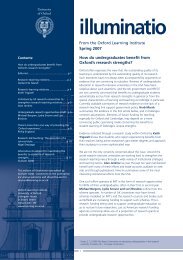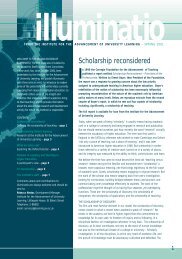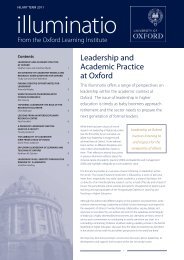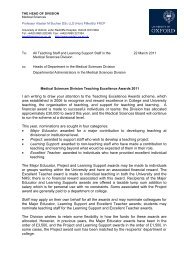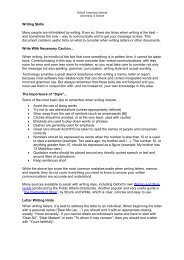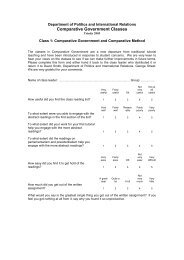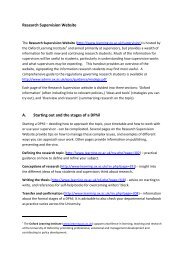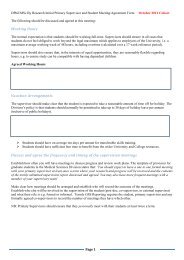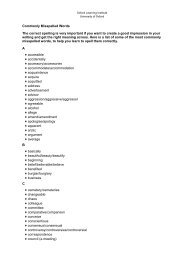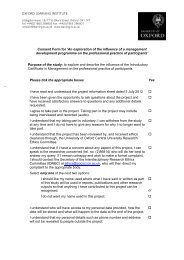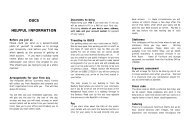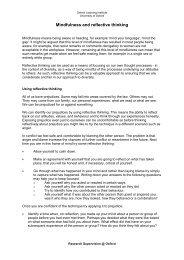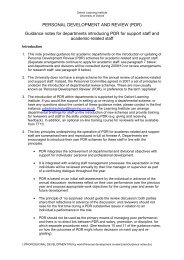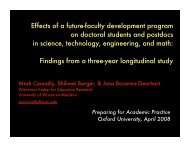Developing the whole student - Oxford Learning Institute - University ...
Developing the whole student - Oxford Learning Institute - University ...
Developing the whole student - Oxford Learning Institute - University ...
You also want an ePaper? Increase the reach of your titles
YUMPU automatically turns print PDFs into web optimized ePapers that Google loves.
Stimulus paper by Kathleen M. Quinlan 08<br />
intimacy 37 and shifting from relying on o<strong>the</strong>rs to self-authorship 38 . Students in higher<br />
education confront new ideas and ways of thinking as <strong>the</strong>y interact with <strong>student</strong>s from<br />
o<strong>the</strong>r backgrounds. Mature <strong>student</strong>s may be at a different developmental stage, but<br />
<strong>the</strong>y are still in a turbulent transition period in which existing views are challenged and<br />
identities are re-made. Indeed, it is plausible that higher education is even more disruptive<br />
because established adults have made bigger investments in <strong>the</strong>ir pre-university identities,<br />
life choices and beliefs. No matter <strong>the</strong>ir age, <strong>the</strong> focus on critical thinking in Western higher<br />
education prompts <strong>student</strong>s to question received wisdom, including value positions<br />
taught by <strong>the</strong>ir families, and practised in <strong>the</strong>ir home communities or workplaces. So<br />
<strong>student</strong>s are in a time of change, in which <strong>the</strong>y must not only deconstruct old meanings<br />
and ways of making meaning, but reconstruct a sense of purpose in <strong>the</strong>ir own life that<br />
integrates expanded perspectives and worldviews 39 . In this sense, <strong>the</strong>re is also a dimension<br />
of spirituality involved in holistic <strong>student</strong> development insofar as spirituality is defined<br />
broadly as connection with something larger than oneself.<br />
Finally, it is argued that higher education does pass on values, whe<strong>the</strong>r we acknowledge it<br />
explicitly or not. Each subject has its own set of operating assumptions and standards that<br />
define what is better or worse or valid or invalid from a disciplinary viewpoint. It is better<br />
to be explicit about <strong>the</strong> values we are seeking to instil, as <strong>the</strong>se can <strong>the</strong>n be subject to <strong>the</strong><br />
kind of questioning that is <strong>the</strong> hallmark of higher education 40 .<br />
Building a vocabulary<br />
Attention to values in higher education often provokes dispute from academics because it<br />
seems to suggest teaching <strong>student</strong>s a particular right way of doing things or thinking. Such<br />
an educational goal is objectionable because: 1) a respect for pluralism and cultural diversity<br />
makes it difficult to advocate one particular value over ano<strong>the</strong>r; 2) it smacks of indoctrination,<br />
which seems to contradict <strong>the</strong> sine qua non of higher education, critical thinking 41 .<br />
37<br />
Erikson (1959)<br />
38<br />
Baxter Magolda (2009)<br />
39<br />
Parks (2000)<br />
40<br />
Grootenboer (2010)<br />
41<br />
Some educational philosophers<br />
argue cogently that moral<br />
instruction is not synonymous<br />
with indoctrination: Tan (2004),<br />
Merry (2005)<br />
42<br />
Macfarlane (2004), Nixon (2009)<br />
43<br />
Macfarlane (2004)<br />
44<br />
Arthur, Wilson et al (2009)<br />
45<br />
Peterson and Seligman (2004)<br />
46<br />
Seligman (2003)<br />
Ra<strong>the</strong>r than teaching a set of rules, principles or standards of behaviour, virtue ethics might<br />
be a more fruitful way of thinking about moral development in higher education 42 . Virtues<br />
‘focus on <strong>the</strong> character of <strong>the</strong> individual (and) are <strong>the</strong> excellences of character that enable<br />
one to achieve <strong>the</strong> “good” life’ 43 . Thus <strong>the</strong> terms ‘virtues’ or ‘character strengths’ locate <strong>the</strong><br />
qualities in <strong>the</strong> people, which is more consistent with <strong>the</strong> overarching <strong>the</strong>me of holistic<br />
<strong>student</strong> development. To UK <strong>student</strong>s and employers, good character is about ‘good<br />
morals and right behaviour’ and includes <strong>the</strong> virtues of empathy, tolerance, care of o<strong>the</strong>rs,<br />
capacity for friendship, honesty, reliability, sincerity, trustworthiness and integrity 44 .<br />
Peterson and Seligman 45 identified a common set of six ubiquitous virtues across <strong>the</strong><br />
world’s major religions and philosophies: wisdom and knowledge; courage; love and<br />
humanity; justice; temperance; and spirituality and transcendence. Each of <strong>the</strong>se six<br />
broad, abstract ideas has several routes to it (which <strong>the</strong>y call character strengths) through<br />
which we achieve <strong>the</strong> virtues. Character strengths, as learnable (acquirable) moral traits<br />
(ie enduring over multiple situations) which are measurable and voluntary (ie we choose<br />
whe<strong>the</strong>r to practise <strong>the</strong>m) 46 , have <strong>the</strong> potential to be influenced by higher education.<br />
The Association of American Colleges and Universities (AACU) sees personal and social<br />
responsibility as one of <strong>the</strong> major groups of learning outcomes essential for twenty-first<br />
century university graduates. They define <strong>the</strong>se outcomes as:<br />
1. Striving for excellence: developing a strong work ethic and consciously doing one’s<br />
very best in all aspects of college.



